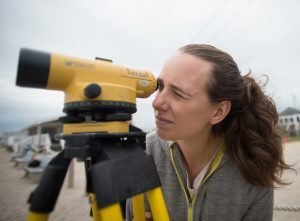 Jacqueline Ronson pitches story ideas to an unlikely group of people – not to her editors, but to her audience.
Jacqueline Ronson pitches story ideas to an unlikely group of people – not to her editors, but to her audience.
“It’s different from the traditional reporting process where you want a big scoop, so you don’t tell anyone what you’ve been working on,” said Ronson, a fellow at The Discourse, an independent journalism company in British Columbia that seeks new approaches to storytelling. One such approach gives the community a say in what stories get covered. “It’s the most exciting thing that I’m doing right now,” she said.
An alumna of Metcalf Institute’s 2015 Annual Science Immersion Workshop for Journalists, Ronson has reported for multiple news organizations, on a national and global scale, covering everything from science, First Nation issues, and the environment to technology and culture.
In 2015 she packed up and moved to picturesque Cowichan Valley on Vancouver Island, BC, seeking local environmental stories and a connection to the people impacted. “This project is about meeting a need for the community and listening to what the community is saying and responding to those concerns.”
Ronson describes a situation in which she pitched a story to area residents about the state of salmon in nearby Cowichan River. Community feedback prompted her to take an entirely different approach.
“I was interested in talking to scientists and learning more about what was going on in the ecosystem,” explained Ronson. After several conversations with community members, Ronson realized that her initial story held little interest for her audience. That’s when she decided to pitch three different stories about larger environmental issues. “A poll is one of the tools The Discourse employs to listen to the community,” she said “I put it out as a poll and had people vote on what they wanted me to cover,” she said.
The topic that received the most interest was a controversial racetrack expansion project that pit the developers against nearby residents. Neighbors are concerned about the impact of track expansion on fish-bearing streams and wildlife. They also worry about the fire risk of high-speed driving at the base of a forested slope. “What’s really interesting is that there has been a drought of reporting on this project,” she said. The poll gave Ronson a starting point to talk people on both sides of the issue, interview experts about the project’s potential environmental impacts, and help the community engage in informed conversations. “It’s a really good moment for people to come together and talk about what they want development to look like here, who should have a say, and how to balance environmental protection and economic development.”
“As journalists, we’re trained to trust our own judgment and follow our own curiosity and decide what stories are worthy of being told,” she added. “The Discourse approach really challenges those assumptions and asks ‘what value are we providing to the community?’”
Ronson didn’t set out to be an environment reporter. She earned her undergraduate degree in global development from Queens University in Ontario, which led to a market research job in Toronto. “I spent a year listening to journalistic podcasts like WNYC’s Radio Lab and WBEZ Chicago’s This American Life,” said Ronson. “That really got me interested in journalism.”
After earning a master’s degree in journalism from the University of British Columbia, she reported for the Yukon News and Inverse, a job she credits her Metcalf fellowship with helping her obtain.
Ronson has received numerous awards throughout her career, including national community newspaper awards for her coverage of the declining Chinook salmon run on the Yukon River and the debate over the potential use of hydraulic fracturing to access the territory’s natural gas resources.
As for her next environmental story in her current position at the The Discourse? That depends on what the community wants to know.
Read More Alumni Profiles
